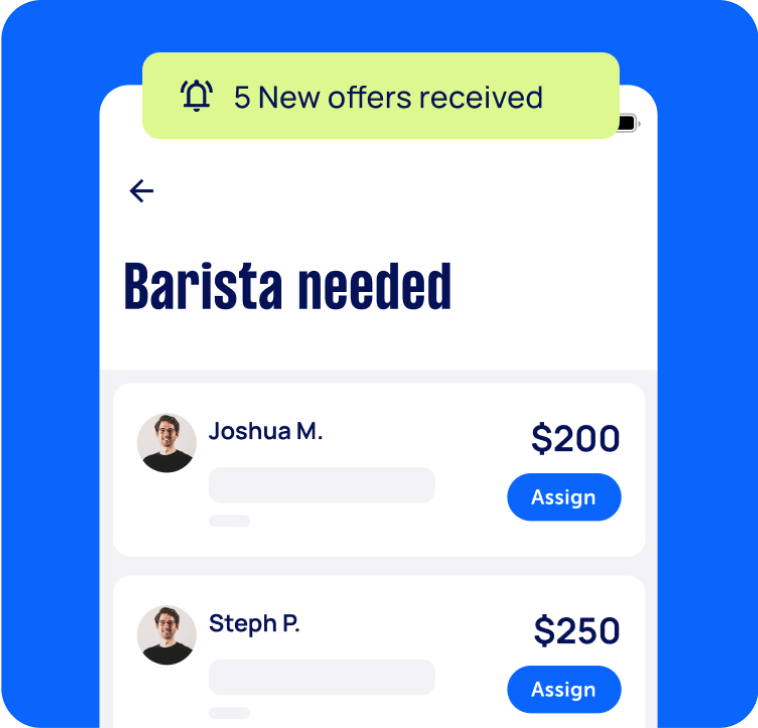

Find a local cognitive behavioural therapist near you
Fill in a short form and get free quotes for professional cognitive behavioural therapy near you
Excellent rating - 4.3/5 (9300+ reviews)
Are you interested in cognitive behavioural ther
- Cognitive restructuring and reframing
- Exposure therapy
- Activity scheduling and behaviour activation
- Successive approximation
- … or anything else
What is Airtasker?

Post your task
Tell us what you need, it's FREE to post.

Review offers
Get offers from trusted Taskers and view profiles.

Get it done
Choose the right person for your task and get it done.
Why book a cognitive behavioural therapy service through Airtasker?
Airtasker is a smart choice when it comes to getting cognitive behavioural therapy. You no longer have to spend so much time and energy book CBT near you that matches perfectly with your needs.
Having harmful and unhealthy thoughts, feelings and behaviours can be detrimental to all aspects of your life. It can affect your relationships, performance at work or school, and how you view yourself and the world. Getting cognitive behavioural therapy online or in-person is a way for you to manage those thoughts and prevent them from getting out of hand.
Just put up a task, and Taskers in your area will come to you with their offers. Make sure to read through their profiles and reviews to see which one you think offers the best face-to-face or online CBT therapy. Rest assured that whoever you choose is a highly-rated and reliable Tasker who’s willing to help you reframe your thoughts into healthier ones.
Flexible pricing
Choose the offer that’s right for you.
Get the best taskers
Judge for yourself – every task gets a review.
Quick offers
Start getting offers to do your task ASAP!
Real reviews
Top Cognitive Behavioural Therapy related questions
Adults of any age can have cognitive behavioural therapy. CBT for children works when they reach a certain age, typically when they are six or seven. This is because children need to understand their thought patterns for CBT to work. But whatever your age, CBT can help you manage your thoughts and emotions and put things into perspective.
The kind of behavioural therapy you should get depends on several factors. These can include the severity of your mental health problem, the goals you want to achieve after taking the treatment, and the kind of recovery process you prefer. To make sure that you take the right one for you, you must discuss your options with your Tasker so that they can assess your needs.
Before anything else, you must look for their qualifications, credentials, and experience as cognitive behavioural therapists. They should have a deep and complete understanding of how CBT works and how to apply it to each of their client’s unique situations. In addition, they must have a high level of self-awareness, empathy and willingness to suspend judgment.
Generally, a CBT course lasts at least 12 to 20 weeks. But it’s essential to keep in mind that each person’s needs are different, and cognitive behavioural therapy is not a one-size-fits-all approach. It depends on many factors, like your preferences and the scope of issues you want to be addressed during your therapy sessions.
Counseling & Therapy Services
Art Therapy
Depression Counselling
Anxiety Counseling
Psychologist
Family Therapy
DBT Therapy
Bereavement & Grief Counseling
Speech Therapy
Child Counseling
Mental Health Services
Group Therapy
EMDR Therapy
Marriage Counseling
Sleep Therapy
Teen Counseling
Christian Counselors
Alcohol Counseling
PTSD Therapy
Anger Management Therapy
Eating Disorder Therapy
Divorce Counseling
Related Services near me
Top Locations
What do cognitive behavioural therapy services include?
Cognitive behavioural therapy or CBT focuses on identifying disturbing or destructive thought patterns that can influence your feelings and behaviours. These negative thoughts are challenged and replaced with realistic and more objective ones. Having healthier thought patterns is also a crucial factor in maintaining your health and wellness. You can have CBT online or wherever you feel most comfortable. Here are the most common techniques that you can expect when getting CBT therapy near you:
Cognitive restructuring and reframing
This technique aims to recognise harmful thought patterns, transform them into more grounded and rational ways of understanding, and deal with challenging situations. For example, maybe you overthink things or always assume that the worst will happen. Your cognitive behavioural therapist will ask about your thought process in particular situations, identify negative patterns, and restructure thoughts into something more productive and positive.
Exposure therapy
If you want to confront your traumas, fears, and phobias, you can find a therapist that uses exposure as a technique. This operates on the idea that avoiding feared situations maintains anxiety and trauma and prevents recovery. By slowly and systematically exposing yourself to the things that provoke fear or anxiety, you learn ways to cope and control the situation, rather than it controlling you. This is usually done in small increments, as the amounts, intensity, and difficulty gradually increase.
Activity scheduling and behaviour activation
This technique for CBT counselling helps people activate productive behaviours by scheduling their activities. Your CBT therapist can work with you as you identify helpful behaviours and schedule your daily activities to increase the likelihood of getting them done. This is especially helpful if you tend to put off an activity due to depression, fear, or anxiety.
Activity scheduling also assists you in forming good habits and allows you to put what you’ve learned from CBT treatment to practice. You can even hire a productivity coach who can help you improve your time management skills to finish all your tasks.
Successive approximation
If you find it challenging to finish a certain task due to a lack of familiarity with the job, anxiety, or any other reason, a successive approximation can help. It teaches you how to break down a specific task into something smaller and more achievable steps. This assists you with gaining confidence as you go by making each successive step build upon the previous ones. This technique revolves around the idea that more difficult emotions feel more manageable by having rehearsed one behaviour.
